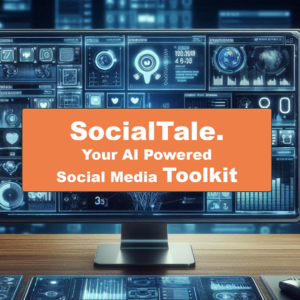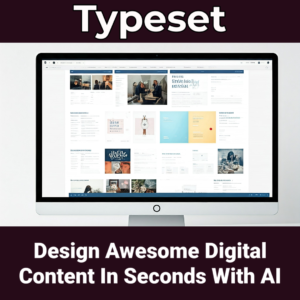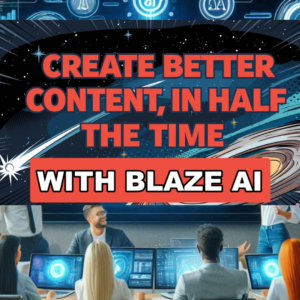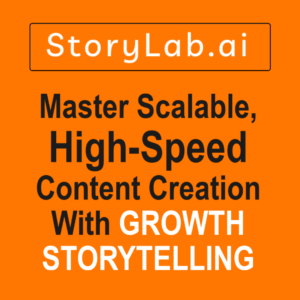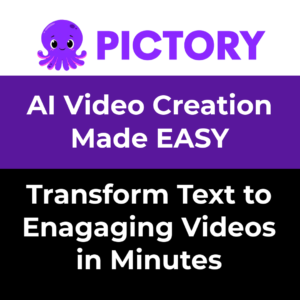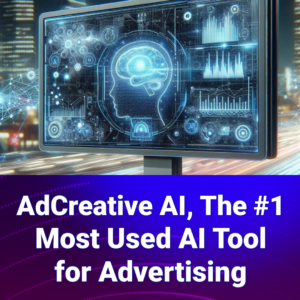AI is revolutionizing the music industry, and you’re about to discover how. Imagine crafting a chart-topping hit with just a few keystrokes, or scoring an entire film without ever touching an instrument. AI music generators are making these scenarios a reality, transforming the landscape of music production.
From indie artists to major studios, creators are harnessing the power of artificial intelligence to push the boundaries of sound. But the impact of this technology extends far beyond traditional music circles. The explosive growth of AI-generated music and its associated tools is democratizing the industry, creating unprecedented opportunities for everyone from C-Suite executives to solopreneurs.
For corporate leaders, AI music generators offer new avenues for brand expression and customer engagement. Imagine tailoring your company’s sonic identity with the same precision you apply to visual branding.
Solopreneurs and small business owners can now access professional-grade music production without the hefty price tag, leveling the playing field in industries where audio quality can make or break success. Content creators, marketers, and even educators are finding innovative ways to integrate AI-generated music into their work, enhancing everything from social media posts to e-learning modules.
This article will take a closer look at AI music generators, which are revolutionizing the music industry and transforming our perception of sound. We’ll uncover how this revolution is not just about music, but about opening new doors for creativity, business, and personal expression across all sectors. Get ready to tune into the future of music – it’s closer than you think, and it’s a symphony of opportunity.
The platforms we’re discussing are certainly not all-inclusive, They were chosen because they have been around for a while, in AI revolutionary terms, or are associated with companies that appear to be well funded and are in the game for the long haul.
Understanding AI Music Generators
AI music generators are tools that use artificial intelligence to create music. These tools can make unique songs for different needs, making music production easier for everyone. Imagine creating a symphony or a catchy jingle without any musical training. That’s the magic of AI music generators.
The Evolution of AI in Music Production
The journey of AI in music production has been amazing. At first, AI was used for simple music compositions, but today, it has evolved into advanced models that can create complex musical pieces. This evolution has opened up new possibilities for musicians, producers, and even hobbyists, making music creation more accessible and innovative.
Key Technologies Behind AI Music Generators
- Neural networks
- Machine learning algorithms
- Natural language processing
Key Takeaway
AI music generators use complex algorithms and deep learning models to analyze and create music, mimicking various styles and genres.
AI Music Generator Platforms Worth Watching
AI Music Generator Free Online
Platforms like AI Music Generator let users create high-quality music from text inputs. These platforms offer a wide range of genres, styles, and moods, allowing users to share their creations online.
MusicGen AI by Meta
MusicGen AI by Meta is a groundbreaking tool that creates music based on text, melody, or audio inputs using a single Language Model (LM). It offers features like melody conditioning, text-conditional generation, and audio-prompted generation.
DeepAI Music Generator
DeepAI Music Generator allows users to create unique music effortlessly. It is perfect for foley, sound effects, and background tracks for videos, customizing soundscapes tailored to specific needs.
Loudly AI Music Generator
Loudly’s AI-generated music spans popular genres from cinematic to hip-hop. It is ideal for music creators, video creators, filmmakers, and advertisers. The platform also generates music stems from unique AI song creations, offering 100% royalty-free music.
AIVA (Artificial Intelligence Virtual Artist)
AIVA allows users to create songs in various styles with generative AI. Users can customize their style models, edit tracks, and monetize compositions with different plans.
Suno
Suno is revolutionizing music creation with its AI-powered platform. It offers a unique blend of lyric generation and music composition, allowing users to create complete songs from scratch.
Soundraw
Soundraw offers a fresh approach to AI music generation, focusing on creating royalty-free music for content creators. Its user-friendly interface allows you to select your preferred genre, mood, and instruments, and the AI generates a unique track based on your specifications.
Mubert
Mubert stands out with its ability to generate endless streams of music in real-time. This platform uses AI to create continuous, non-repeating music tracks that can be tailored to specific moods, activities, or brands.
Udio
Udio brings a collaborative element to AI music generation. This platform allows multiple users to work together on music projects, leveraging AI to assist in composition and production.
Key Takeaway
A variety of AI music generation platforms cater to different needs, from free online tools to sophisticated platforms for professional use.
Applications and Real-World Impact
Entertainment Industry
Background Scores and Soundtracks
AI music generators are changing the entertainment industry by creating background scores and soundtracks for films, TV shows, and video games. These tools reduce the need for expensive studio time and professional musicians, making high-quality music production more accessible.
Jingles and Advertisements
In the world of marketing and advertising, AI music generators are used to create catchy jingles and advertisements. These tools enable brands to produce high-quality music that resonates with their target audience, enhancing their marketing efforts.
Marketing and Advertising
Custom Music for Campaigns
AI music generators enable marketers to create custom music for their campaigns, ensuring that the music aligns perfectly with the brand’s message and target audience.
Enhancing Brand Identity
By using AI-generated music, brands can enhance their identity and create a unique auditory experience for their customers.
Education and Learning
Teaching Music Composition
AI music generators are used in educational settings to teach music composition and theory. These tools provide students with interactive and engaging learning experiences, making it easier to understand complex musical concepts.
Interactive Learning Tools
AI music generators offer interactive learning experiences, making it easier for students to understand complex musical concepts.
Therapeutic Uses
Music for Relaxation
AI-generated music is used in therapeutic settings to create personalized music for relaxation and mental well-being.
Personalized Wellness Applications
AI music generators help in creating customized wellness applications, providing users with music tailored to their specific needs and preferences.
Key Takeaway
AI music generators have wide-ranging applications across industries, from entertainment and marketing to education and therapy.
Benefits of AI Music Generators
Accessibility and Democratization
AI music generators democratize music production, making it accessible to individuals without formal musical training.
Cost-Effectiveness
By reducing the need for expensive studio time and professional musicians, AI music generators help in cutting down production costs.
Creative Freedom and Innovation
AI music generators provide users with creative freedom, allowing them to experiment with different styles and genres.
Key Takeaway
AI music generators offer accessibility, cost-effectiveness, and creative freedom, making high-quality music production available to a wider audience.
Future Prospects of AI Music Generators
Advancements in AI Technology
As AI technology continues to evolve, the capabilities of music generators will expand, offering more sophisticated and nuanced compositions.
Integration into Mainstream Media
AI-generated music will become more integrated into mainstream media, including films, TV shows, and advertisements.
Expanding Educational and Therapeutic Applications
The use of AI music generators in educational and therapeutic settings will continue to grow, providing more interactive and personalized experiences.
Key Takeaway
The future of AI in music is bright, with continued advancements leading to more sophisticated compositions and wider integration across various fields.
Challenges and Ethical Considerations
Intellectual Property Issues
Discuss the intellectual property challenges associated with AI-generated music and the need for clear regulations.
Quality and Authenticity Concerns
Examine the concerns regarding the quality and authenticity of AI-generated music and how these issues can be addressed.
Ethical Use of AI in Music
Explore the ethical considerations of using AI in music production, including the impact on human musicians and the music industry.
Key Takeaway
While AI music generators offer numerous benefits, they also present challenges related to intellectual property, quality, and ethical considerations that need to be addressed.
Conclusion
Recap of Key Points
AI music generators are revolutionizing music production by making it more accessible, cost-effective, and innovative. These tools are being used in a variety of industries, from entertainment and marketing to education and therapy, demonstrating their versatility and effectiveness.
The Future of AI in Music
The future of AI in music is bright, with advancements in technology opening up new possibilities for musicians, producers, and content creators. AI music generators will continue to push the boundaries of what is possible in music production, creating new opportunities for creativity and innovation.
FAQs
- How do AI music generators work?
- AI music generators use advanced algorithms and deep learning models to analyze and generate music. These tools can create unique compositions based on text, melody, or audio inputs, making music production more accessible and innovative.
- Can AI music generators replace human musicians?
- While AI music generators can create high-quality music, they are not intended to replace human musicians. Instead, they are designed to enhance the creative process and provide new opportunities for innovation and experimentation.
- What are the benefits of using AI music generators?
- AI music generators offer a range of benefits, including accessibility, cost-effectiveness, and creative freedom. These tools make it possible for anyone to create high-quality music, regardless of their musical background or experience.
- How are AI music generators used in marketing and advertising?
- AI music generators are used to create custom music for marketing campaigns, enhancing brand identity and creating a unique auditory experience for customers. These tools can generate catchy jingles and advertisements that resonate with the target audience.
- What are the ethical considerations of using AI in music production?
- The use of AI in music production raises important ethical questions about the role of human musicians and the future of the music industry. Ensuring the quality and authenticity of AI-generated music and addressing intellectual property issues are key challenges moving forward.
- What is the future of AI in music?
- The future of AI in music is bright, with advancements in technology opening up new possibilities for musicians, producers, and content creators. AI music generators will continue to push the boundaries of what is possible in music production, creating new opportunities for creativity and innovation.





